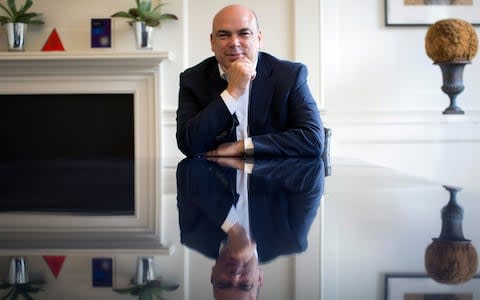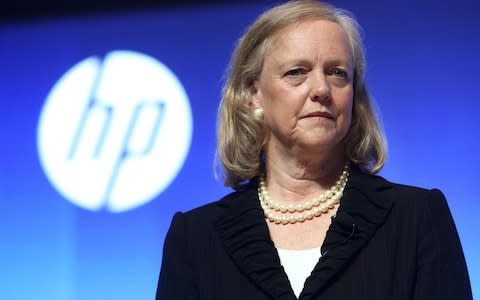Tech's $5bn trial of the century: Mike Lynch vs Hewlett Packard and the story so far

A bitter and long-running legal dispute between Autonomy founder Mike Lynch and Hewlett Packard will finally reach the High Court in London on Monday, in what has been described as the UK tech trial of the century.
HP is seeking around $5bn in damages from Lynch and his former chief financial officer, Sushovan Hussain, accusing them of fraudulently inflating the value of Autonomy, which it bought for $11bn in 2011. The civil trial is one of the largest damages claims in English legal history, and is expected to finish at the end of the year.
When Lynch pulled off the sale of his software company to HP he was hailed as “Britain’s Bill Gates”. But within months, the deal had soured. One year after the acquisition, HP wrote off almost the entire value of Autonomy and Lynch was fired.
HP’s then chief executive Meg Whitman accused Autonomy of “accounting improprieties, misrepresentations and disclosure failures”.
Lynch and Hussain deny the allegations and Lynch is counter-suing HP for over $150m in damages, accusing the company of smearing his reputation. The men say the writedown of Autonomy’s value was caused by HP’s own failure to integrate the company with its existing business.
The civil trial, which is expected to last over nine months, will be the first time that Lynch has been given the chance to publicly defend himself before a judge.
It’s likely to be a tough fight with HP preparing to deploy star witnesses, including two of its former chief executives and a senior figure at Autonomy who is now giving evidence against his former boss.

But the proceeding will be overshadowed by criminal charges filed by US prosecutors, which accuse Lynch and former Autonomy finance executive Stephen Chamberlain of fraud. In a dramatic twist, on Friday night, days before the British trial was set to begin, US prosecutors filed an additional three charges. The move prompted Lynch’s lawyers to break from their preparations for the trial to accuse the US government of taking a Wild West-style “shoot first, ask questions later” approach to its criminal investigation.
Hussain, Lynch’s co-defendant, was found guilty of accounting fraud on 16 counts in the US last year but has not yet been sentenced. His lawyers have said that he will appeal.
Lynch has become something of a modern day Renaissance man since being fired from HP in 2012, turning to investments through his Invoke Capital fund. He’s backed businesses including Cambridge-headquartered cybersecurity firm Darktrace, as well as legal technology business Luminance and Sophia Genetics.
Away from his business deals, Lynch maintains a Suffolk manor house that sits on a 69-acre estate and is a proud conservationist of rare breeds of pigs and cattle.
But Lynch’s quiet life in the bucolic English countryside risks unravelling due to the dual threat of the British fraud trial and the US criminal charges.
The High Court trial will mean that Lynch comes face to face with two former HP chief executives: Léo Apotheker and his successor Meg Whitman. Apotheker was one of the architects of the deal to purchase Autonomy. The German executive, who had worked for software giant SAP for twenty years before joining HP, had ambitious plans. He wanted to transform the US group from an aging computer hardware business that was known for selling printers and computer screens into a cutting edge software business.

Lynch was understandably excited by Apotheker’s vision, praising HP’s “amazing strategy” in buying Autonomy. That up-beat sentiment was short-lived. Court filings show that HP’s board expressed concerns about the deal on August 17, 2011, the day before it was announced. In an emergency meeting, the board considered firing Apotheker over the acquisition, but eventually approved the deal.
Apotheker was eventually fired on September 22 following a 20pc drop in HP’s share price in a single day after the company announced weak earnings, the end of its Palm operating platform, and the Autonomy deal. He had lasted less than a year at the top of HP.
“After the deal, they get fired and we’re left with a hardware group that used to call us the step-child,” Lynch said in 2016. “All the understanding of clever, high growth, software people wasn’t there.”
HP’s board brought in Meg Whitman as its new chief executive. Whitman, a seasoned executive who had worked at eBay as well as The Walt Disney Company and Hasbro, never saw eye-to-eye with Lynch. The straight-shooting Republican, who was a senior member of Mitt Romney’s presidential bid and once ran for governor of California, quickly fell out with Autonomy’s founder.
The pair clashed over everything from Whitman’s love of country music to how to merge Autonomy and HP’s businesses. Court filings claim that Whitman - a billionaire with a fortune worth an estimated $3.2bn - “repeatedly adopted the management approach of ... playing country music to the meeting, instructing the senior executives attending to take the meaning of the country music songs and apply them to their own management methods”.

Whitman’s management technique didn’t go down well with Lynch, who prefers jazz and once managed his own five-piece band.
Other documents filed in the case talk of a “botched” deal and pleas from Lynch for Whitman to “address the chaos then reigning internally at HP”.
In 2012, Lynch was fired by Whitman, who wrote down the valuation of Autonomy and publicly accused the business of a litany of failures and impropriety.
The High Court trial will also hear evidence from Christopher Egan, Autonomy’s former US head. Egan is expected to be one of HP’s star witnesses after striking a plea deal with the US Department of Justice in 2017. Following months of negotiations, Egan is expected to give evidence from the US via video link. HP lawyers have said that Egan “personally concluded many of the transactions that are in issue in this case”.
There were still doubts over the weekend if Lynch would attend the first day of the trial, after skipping two hearings in the US earlier this year on the grounds of ill health.
But for Lynch, who is considering fighting extradition to the US, a trial on home turf may be more comfortable ground for Britain’s Bill Gates.

 Yahoo Finance
Yahoo Finance 